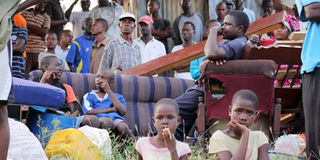Kenya is now a Dunga Unuse nation

Residents of Dunga Unuse area, Changamwe, Mombasa County, evicted on September 22, 2015. The Dunga Unuse eviction is a symptom of a justice system that does not defend the vulnerable and a security system that protects the powerful by violating the rights of the poor. PHOTO | WACHIRA MWANGI | NATION MEDIA GROUP
What you need to know:
- Last week, it was Dunga Unuse’s turn when two giant diggers, regular and GSU police together with tracker dogs flattened 100 homes before any intervention could obstruct the destruction.
- Dunga Unuse eviction took place three days after the local OCPD received a court warrant. No notice to vacate was given to the residents.
- Dunga Unuse, I am informed, means a half a glass — not of water. The new Constitution offered us a half glass of hope. It was our duty to fill it to the full by implementation.
Forced evictions have become so frequent in Mombasa that I dread turning on my phone early morning.
Two weeks ago, Kwa Punda was raided and only halted after our long engagement with the police.
Last week, it was Dunga Unuse’s turn when two giant diggers, regular and GSU police together with tracker dogs flattened 100 homes before any intervention could obstruct the destruction.
The Dunga Unuse eviction is a symptom of a justice system that does not defend the vulnerable and a security system that protects the powerful by violating the rights of the poor.
Dunga Unuse eviction took place three days after the local OCPD received a court warrant. No notice to vacate was given to the residents.
The court file shows no record of a judgment to evict; instead it records October 1 as the next date for a mention. The occupants of the land were never represented in court because they were never served.
Instead, five unknown people were named as defendants in the recently resurfaced 2010 case. Amazingly, too, the case was heard by a magistrate in a lower court, whose jurisdiction could certainly be challenged.
NO PUBLIC OUTRAGE
Four days after the first eviction, another team of Police — the Administration brand — returned to supervise the construction of a perimeter wall on the site.
When Mombasa Lands minister Francis Thoya demanded letters of approval for construction, he was informed that the County Commissioner had approved and that was enough. So much for devolving planning powers to the counties!
This whole criminal episode could have come from the archives of the colonial era, but it still continues and is tolerated in 2015.
Yet the only response from the chairman of the National Land Commission (NLC) was to lament that the file is missing from the lands registry. Leadership like that only adds insult to injury.
The forces that control the land, wealth and security of this nation are still very much in place. Resistance to change is as powerful as ever.
Losing homes and livelihoods destroys families and futures but there is no public outrage. That has not changed either. That perhaps is the most worrying aspect of all.
A PLIANT CITIZENRY
We watch thousands of refugees, victims of war, head for Europe and are outraged when they are delayed at borders.
Yet when our fellow Kenyans are made refugees by violence declared on them by its own government we can’t even walk a kilometre to sympathise. Why? Maybe that is the shocking legacy of the post-election violence.
We have been beaten into submission and silence. We fear that any confrontation may lead to more violence and loss of life and property. We haven’t dealt with the past so we dread a repetition.
So we make do and remain silent as fellow Kenyans are bulldozed into oblivion.
Dunga Unuse, I am informed, means a half a glass — not of water. The new Constitution offered us a half glass of hope. It was our duty to fill it to the full by implementation.
Alas, each day we see its contents spilled and spoiled. Soon the glass may be shattered into pieces. Will we then resist or surrender?





